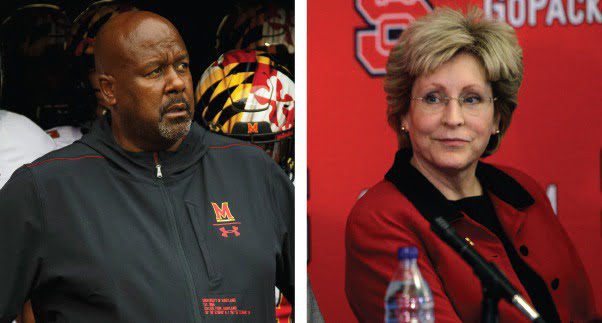
Debbie Yow showed faith in Michael Locksley early in his career by keeping him on as an assistant football coach at Maryland despite the dismissal of the man who hired him, Ron Vanderlinden.
It was an act Locksley, who is now the head coach at Maryland, never forgot.
So when he began assembling a board of directors for a nonprofit organization designed to identify and groom coaches of color for high-profile jobs they’ve traditionally been denied, Yow was among those he approached for help.
“Coach Locksley called me and asked if I would serve,” the retired NC State athletic director said of her position with the National Coalition of Minority Football Coaches. “We just have a strong, trusting relationship through 23 years. I’m excited about the possibility of helping people reach their full potential.”
Yow is joined on the group’s board by a who’s who of luminaries that includes Pittsburgh Steelers coach Mike Tomlin, Baltimore Ravens general manager Ozzie Newsome, Alabama coach Nick Saban, NFL executive Doug Williams — the first black quarterback to win a Super Bowl — and Willie Jeffries, who in 1979 became the first black head coach in Division I football.
“These are all people that have either hired head coaches or coordinators or filled upper-level positions throughout their careers,” Locksley said. “They all have been at the top of the mountain in their respective areas, whether winning Super Bowls or national championships or being pioneers, like Debbie Yow and Willie Jeffries.
“We want to use their experiences to help us formulate and produce the list of qualified candidates, so when people say there aren’t enough minorities to fill the positions that have come open over the years, we’re going to produce a list of qualified people that shows there are qualified people. What’s needed is opportunities.”
Although Yow is neither African American nor a football coach, her experience as one of the first female athletic administrators at a Division I college with a track record of hiring diverse coaches gives her a unique perspective in helping Locksley speed up the process of creating those opportunities.
“As a former AD for 29 years and a coach before that in a sport that had similar issues in terms of, in that regard, women as coaches, there’s a flow to this that might not be apparent,” said Yow, who coached basketball at Kentucky, Oral Roberts and Florida before going into administration.
“I’m hopeful to have the opportunity to visit with coaches who want to become coordinators and coordinators who want to become head coaches to counsel them on what matters to directors of athletics, and how you can best ensure that values alignment is made clear during interviews.”
Locksley’s career illustrates the lack of progress that has been made in the hiring of minorities for important positions in football.
In 2009, when he was named to lead the program at New Mexico, he was one of only four African American head coaches in college football’s top ranks. Today, he is one of just 13 at the 130 FBS schools across the country.
The percentage of black head coaches in the NFL isn’t much better. Despite the so-called “Rooney Rule” that requires teams to interview minority candidates for all high-level jobs such as head coaches and general managers, only three of the NFL’s 32 teams currently have black head coaches.
While identifying potential candidates and helping groom them for those jobs is an important part of the National Coalition of Minority Football Coaches’ mission, Yow said that’s only the tip of the iceberg when it comes to changing the culture in college and professional sports.
“I’m going to offer a little bit of grace to people for gravitating to hires of individuals that look like them,” she said. “When I became an AD in 1990, a female AD in Division I was literally unheard of. Things are different now 30 years later, but it has been painful. I think we’re making progress in how people think about women as athletic directors.
“This is not that dissimilar, how people think about black men as head coaches or as coordinators, especially at the Power Five level. I think this is an initiative that’s overdue, and I’m thrilled to be part of it.”


